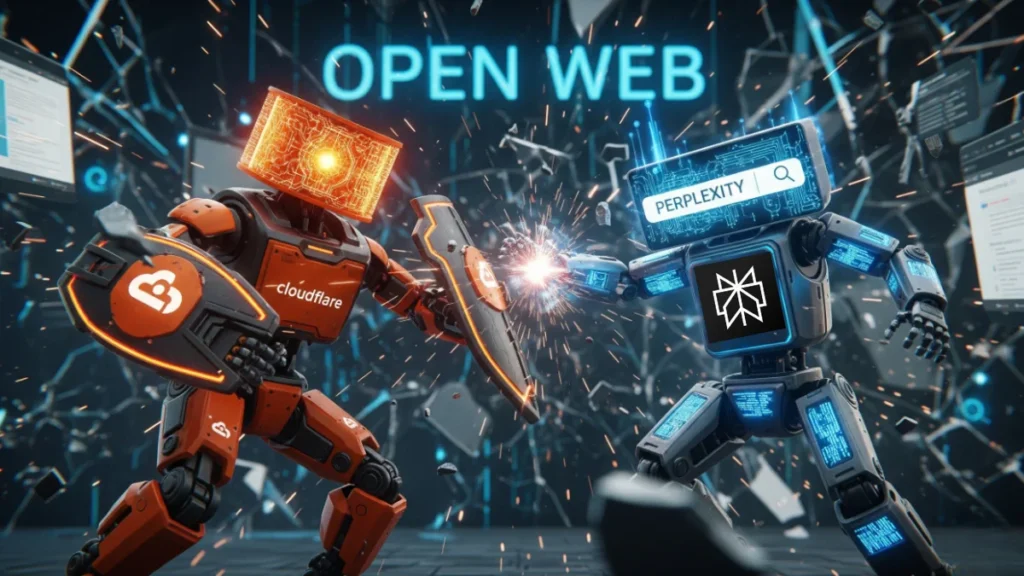As AI assistants become everyday tools, the old definition of “bots” no longer fits. But when Cloudflare wrongly flagged user-driven AI agents like Perplexity as scrapers, it sparked a heated debate over the future of web access and who gets to define it.
AI or Bot? The Internet’s Identity Crisis Just Escalated
When you ask Perplexity AI to look something up, it’s not just querying a preloaded database—it’s fetching live data from the open web just like a human assistant would. But according to Cloudflare, that behavior looks suspiciously like bot activity. And that mischaracterization could be more than a technical hiccup—it could redefine how we access the internet.
In recent weeks, a storm has been brewing between Cloudflare, a leading internet security and performance provider, and Perplexity, one of the fastest-growing AI-powered information agents on the web. At the heart of the controversy: what counts as a bot, and who gets to control access to the internet?
Key Takeaways:
- Not all bots are the same: Perplexity’s user-driven agents only fetch data when prompted—unlike traditional web crawlers.
- Cloudflare’s accusations are flawed: Their analysis confused Perplexity’s activity with unrelated traffic, leading to inaccurate claims.
- Web access is at stake: Overblocking AI tools limits users’ ability to access timely, personalized information.
- AI assistants aren’t scrapers: They act on behalf of real users, not to build massive datasets or train AI models.
- Gatekeeping is growing: The internet risks becoming two-tiered—one for approved tools, another for blocked innovation.
The Evolution from Crawlers to Assistants
Back in the early web days, bots served basic functions—indexing, link-checking, scraping for search engines. They were easy to identify and had clear boundaries. But the web is different now. AI assistants like Perplexity don’t roam the web collecting data. Instead, they respond in real-time to individual queries, retrieving and summarizing content to serve specific user needs.
This marks a fundamental shift from passive indexing to active, human-initiated exploration of the web.
Yet, Cloudflare seems stuck in the past.

Cloudflare’s Big Mistake
In a now widely criticized blog post, Cloudflare accused Perplexity of “stealth crawling” and evading detection with hidden bots. But Perplexity fired back—hard.
According to Perplexity, Cloudflare confused legitimate user agent activity with traffic from BrowserBase, a separate cloud browser service Perplexity barely uses (under 45,000 daily requests). Cloudflare, they claim, misattributed up to 6 million daily requests—a colossal error for a company whose entire business depends on tracking and categorizing internet traffic.
Even more shocking: the technical diagram Cloudflare published to “expose” Perplexity’s behavior was completely inaccurate. It showed a fictional crawl pattern that doesn’t resemble how Perplexity operates.
What’s Really Happening?
Unlike traditional bots, Perplexity’s AI agents only act when a human user asks a question. They don’t store, reuse, or train on the content they fetch. They’re tools—just like a browser or email client—that extend the user’s intent into the web.
Blocking these agents isn’t just a misclassification. It penalizes users for how they choose to access information.
Imagine trying to research a medical issue, compare hotel reviews, or explore breaking news—and being blocked because your AI assistant is labeled as a threat. That’s not security. That’s censorship.
The Bigger Problem: Gatekeeping the Open Web
Cloudflare’s actions reveal a troubling trend: centralized infrastructure providers deciding what tools are allowed to access the internet.
When technical misunderstandings turn into policy decisions, it creates a two-tiered web—one for tools that comply with gatekeepers, and one for those that don’t. That threatens innovation, fairness, and accessibility.
The open web is built on user choice. Whether you use a search engine, a voice assistant, or an AI agent, you should have the right to access public content in the way that suits you best.
What This Means for the Future
Cloudflare’s bot crackdown may seem like a technical issue, but it’s actually a battle for the soul of the internet. Will we allow innovation in how we access and process information? Or will a handful of infrastructure providers decide what’s allowed?
If we mislabel every new AI tool as a scraper, we risk suffocating progress before it even begins.
Conclusion
AI agents like Perplexity aren’t threats—they’re tools built for real people. The true danger lies in misunderstanding them and, worse, building policies on top of those misunderstandings. If companies like Cloudflare can’t tell the difference, maybe they shouldn’t be the ones making the call.
Source: Perplexity
